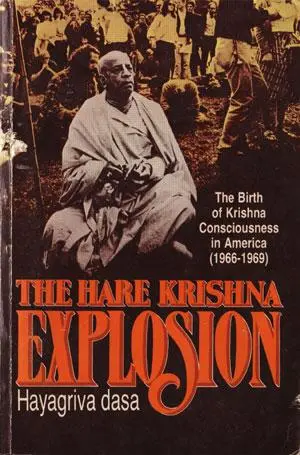28 Jun 2023
by The Hare Krishna Movement
in A. C. Bhaktivedanta Swami Prabhupada, Bhagavad-gita, chanting, Chanting Hare Krishna, Krsna Consciousness, Letters by Srila Prabhupada, Maha-mantra, Mantra Meditation, Uncategorized
Tags: chanting, chanting Hare Krishna, Hare Krishna, Letters by Srila Prabhupada, Maha Mantra, mantra meditation
The nice thing about mantra meditation or chanting the maha mantra:
Hare Krishna, Hare Krishna, Krishna Krishna, Hare Hare, Hare Rama, Hare Rama , Rama Rama, Hare Hare
is that one can do it anywhere, any time. In a plane, train or automobile, sitting, walking, or standing on one’s head. I find myself chanting when I am working in my shop, cutting the lawn, taking a shower, working in the garden. Chanting always makes me feel better.
“…one should learn the art of chanting the Holy name of Krishna 24 hours a day and that alone is the remedy for all problems of material existence.” (from letter to Susan Beckman August 29th 1973)
Prabhupada: The chanting is a process of purification. Just like we use soap to cleanse the body, this is material, but the chanting is spiritual cleansing. The three stages of cleansing are first
(1) To clean the mirror of the mind. In the Bhagavad Gita it is said:
“The mind is the best friend and the worst enemy, for one who has learned to control the mind it is the best of friends but for one who has failed to do so it is the worst enemy.”
Due to long term association, the mind absorbed in material things has become contaminated, or dirty, the chanting process purifies the mind.
(2) Then the next stage, when the mind is cleansed one becomes free from the symptoms of material existence. Material existence means to be always hankering and lamenting. I must have a new automobile, I must have more money, I must have good wife, I must have this I must have that. Then when I have the thing, I lament, I have lost my wife, I have lost my money, I have lost my car, simply lamenting. So the second stage is to be free from this anxiety.
(3) The third stage is “He never laments nor desires to have anything; he is equally disposed to every living entity. In that state he attains pure devotional service unto me.”
“One who is thus transcendentally situated at once realizes the Supreme Brahman and becomes fully joyful. He never laments or desires to have anything. He is equally disposed toward every living entity. In that state he attains pure devotional service unto Me.”
Full Letter
More
29 Jun 2022
by The Hare Krishna Movement
in A. C. Bhaktivedanta Swami Prabhupada, chanting, Chanting Hare Krishna, Lectures
Tags: A.C. Bhaktivedanta Swami Prabhupada, chant Hare Krishna, Hare Hare, Hare Krishna, Hare Rama, Krishna, Maha Mantra, mantra meditation, Srila Prabhupada
The Meaning of the Hare Krishna Mantra
Lecture on Maha-mantra New York, September 8, 1966
By His Divine Grace A.C.Bhaktivedanta Swami Prabhupada
Prabhupada: Now, some of you members have asked me to explain the meaning of this chanting, Hare Krishna, Hare Krsna, Krsna Krsna, Hare Hare. Hare Rama, Hare Rama, Rama Rama, Hare Hare. Now, this sound is transcendental sound, transcendental sound, incarnation, sound incarnation of the Absolute Truth. Just try to understand what is incarnation. Incarnation means…
More
02 Oct 2019
by The Hare Krishna Movement
in A.C. Bhaktivedanta Swami Prabhupada, Caaitanya-caritamrta, Chanting Hare Krishna
Tags: Adi-lila 21-23, chanting Hare Krishna, eva, Hare Krishna, harer nama, Maha Mantra, mantra meditation, names of the lord

Srila Prabhupada describes the formula for success: “Our request to all our students is that they daily chant at least sixteen rounds of this harer nāma mahā-mantra offenselessly, following the regulative principles. Thus, their success will be assured without a doubt.”
More
28 Jul 2019
by The Hare Krishna Movement
in Kali Yuga, Uncategorized
Tags: A.C. Bhaktivedanta Swami Prabhupada, chanting Hare Krishna, Hare Krishna Mantra, Hare Krsna, Kali-yuga, Maha Mantra, Srila Prabhupada
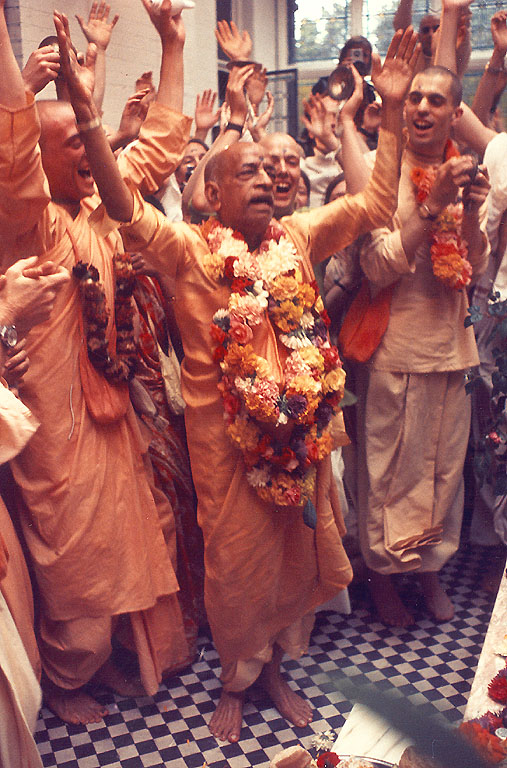
We all have our favorite quotes and slokas from the pages of Srila Prabhupada’s books. One of mine is the following:
“My dear King, although Kali-yuga is full of faults, there is still one good quality about this age. It is that simply by chanting the Hare Kṛṣṇa mahā-mantra, one can become free from material bondage and be promoted to the transcendental kingdom.” (Bhāg. 12.3.51)
Srila Prabhupada quotes this partictular verse from the Bhagavatam many times in his lectures, conversations, books etc., for instance:
“In the sastra it is said this Kali-yuga is full of faults, so many faults. It is the ocean of faults. But there is a very nice thing, asti hy eko mahan gunah, a very great quality. What is that? Kirtanad eva krsnasya mukta-sangah param vrajet [SB 12.3.51]. If you simply chant Hare Krishna mantra, then you become perfect. Is it very difficult? Chant Hare Krishna and you become perfect. But we are so unfortunate, we are not even prepared to chant. This is our position. So you have to make little determination that ‘I shall chant henceforward Hare Krishna mantra.’ Then everything is all right.”
More
28 Oct 2016
by The Hare Krishna Movement
in A.C. Bhaktivedanta Swami Prabhupada, chanting, Chanting Hare Krishna, Maha-mantra, Mantra Meditation
Tags: Adi 7.72, chanting Hare Krishna, essence of all mantras, holy name of Krsna, japa, Lord Visnu, Madhya22.113, Maha Mantra, mantra meditation, spiritual master, success in spiritual life, Vedic hymns, Vedānta philosophy
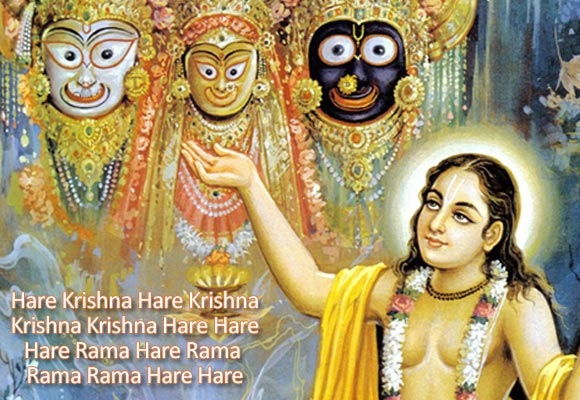
This morning I was reminded of the importance of chanting sixteen rounds. Sometimes I think my work or service is more important than my chanting…but in the following verses and purports Srila Prabhupa makes it very clear; “One may have other duties to perform under the direction of the spiritual master, but he must first abide by the spiritual master’s order to chant a certain number of rounds.”, and I thank the devotee who reminded me of this important instruction.
…There are many regulative principles in the śāstras and directions given by the spiritual master. These regulative principles should act as servants of the basic principle-that is, one should always remember Kṛṣṇa and never forget Him. This is possible when one chants the Hare Kṛṣṇa mantra. Therefore one must strictly chant the Hare Kṛṣṇa mahā-mantra twenty-four hours daily. One may have other duties to perform under the direction of the spiritual master, but he must first abide by the spiritual master’s order to chant a certain number of rounds. In our Kṛṣṇa consciousness movement, we have recommended that the neophyte chant at least sixteen rounds. This chanting of sixteen rounds is absolutely necessary if one wants to remember Kṛṣṇa and not forget Him. Of all the regulative principles, the spiritual master’s order to chant at least sixteen rounds is most essential. (from purport Madhya-lila 22.113)
…Of all the sacrifices, the chanting of Hare Kṛṣṇa, Hare Kṛṣṇa, Kṛṣṇa Kṛṣṇa, Hare Hare/ Hare Rāma, Hare Rāma, Rāma Rāma, Hare Hare is the purest representation of Kṛṣṇa. (from purport Bg 10.25)
…Śrī Bhaktisiddhānta Sarasvatī Gosvāmī Mahārāja comments in this connection, “One can become perfectly successful in the mission of his life if he acts exactly according to the words he hears from the mouth of his spiritual master.” This acceptance of the words of the spiritual master is called śrauta-vākya, which indicates that the disciple must carry out the spiritual master’s instructions without deviation. Śrīla Viśvanātha Cakravartī Ṭhākura remarks in this connection that a disciple must accept the words of his spiritual master as his life and soul. Śrī Caitanya Mahāprabhu here confirms this by saying that since His spiritual master ordered Him only to chant the holy name of Kṛṣṇa, He always chanted the Hare Kṛṣṇa mahā-mantra according to this direction (‘kṛṣṇa-mantra’ japa sadā,-ei mantra-sāra). (from purport to Adi-lila 7.72)
More
17 Aug 2016
by The Hare Krishna Movement
in A.C. Bhaktivedanta Swami Prabhupada, Balarama, Festivals
Tags: A. C. Bhakthvedanta Swami Prabhupada, appearance of balarama, Balarama, expansion of Balarama, Hare Rama, Lord Balarama, Lord Nityananda, Maha Mantra, Maha-Visnu, prakasa vigraha of Lord Krsna, Rama, SB 1.14.29, spiritual master, visnu-tattva
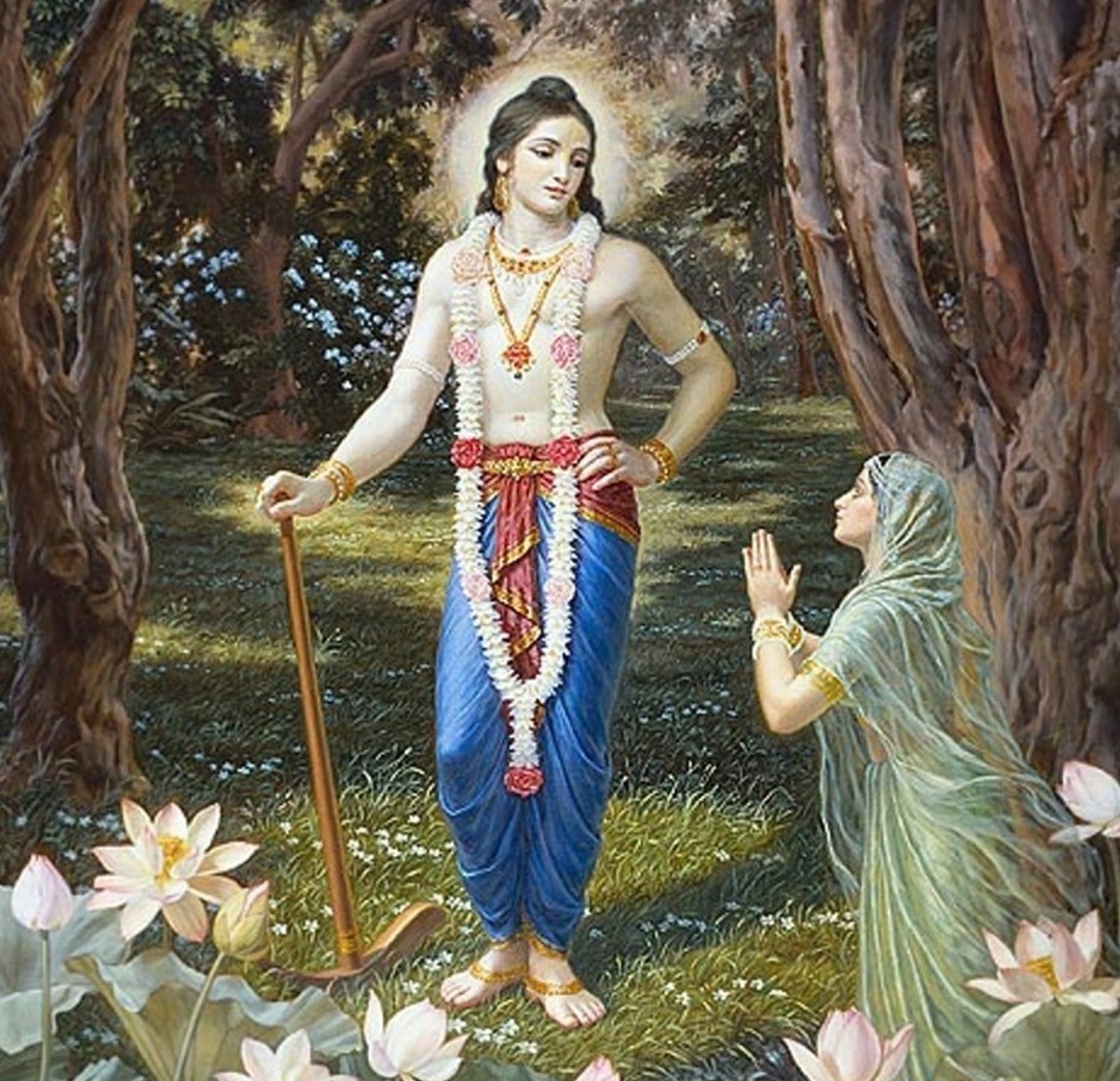
Today marks the auspicious appearance of Lord Balaram. We honor it with a half day fast and celebration. Our post today includes a few select excerpts, as well as a slide show on images of Sri Balarama in various pastimes.
…Mahā-Viṣṇu is actually an expansion of Balarāma, who is Kṛṣṇa’s first expansion and, in the Vṛndāvana pastimes, His brother. In the mahā-mantra-Hare Kṛṣṇa, Hare Kṛṣṇa, Kṛṣṇa Kṛṣṇa, Hare Hare Hare Rāma, Hare Rāma, Rāma Rāma, Hare Hare-the word Rāma refers to Balarāma. Since Lord Nityānanda is an expansion of Balarāma, Rāma also refers to Lord Nityānanda. Thus Hare Kṛṣṇa, Hare Rāma addresses not only Kṛṣṇa and Balarāma but Lord Caitanya and Lord Nityānanda as well. (from Introduction to Sri Caitanya-caritamrta 1975 Edition)
…Amongst various names of the relatives, the name of Rāma or Balarāma, eldest brother of Lord Kṛṣṇa, is added with the words “the Personality of Godhead” because Lord Balarāma is the immediate expansion of viṣṇu-tattva as prakāśa-vigraha of Lord Kṛṣṇa. The Supreme Lord, although one without a second, expands Himself as many other living beings. The viṣṇu-tattva living beings are expansions of the Supreme Lord, and all of them are qualitatively and quantitatively equal with the Lord. But expansions of the jīva-śakti, the category of the ordinary living beings, are not at all equal with the Lord. One who considers the jīva-śakti and the viṣṇu-tattva to be on an equal level is considered a condemned soul of the world. Śrī Rāma, or Balarāma, is the protector of the devotees of the Lord. Baladeva acts as the spiritual master of all devotees, and by His causeless mercy the fallen souls are delivered. Śrī Baladeva appeared as Śrī Nityānanda Prabhu during the advent of Lord Caitanya, and the great Lord Nityānanda Prabhu exhibited His causeless mercy by delivering a pair of extremely fallen souls, namely Jagāi and Mādhāi. Therefore it is particularly mentioned herein that Balarāma is the protector of the devotees of the Lord. By His divine grace only one can approach the Supreme Lord Śrī Kṛṣṇa, and thus Śrī Balarāma is the mercy incarnation of the Lord, manifested as the spiritual master, the savior of the pure devotees. (from purport to SB 1.14.29)
Slide show More
30 Mar 2015
by The Hare Krishna Movement
in Chanting Hare Krishna, Kali Yuga, Mantra Meditation
Tags: chant and be happy, chanting Hare Krishna, Hare Hare, Hare Krishna, Hare Rama, Maha Mantra, mantra meditation
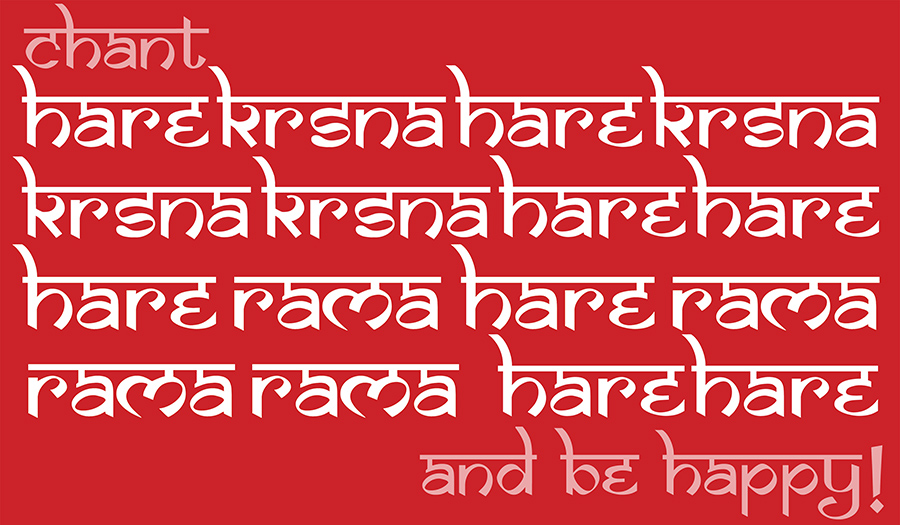
click on image to enlarge
“In the sastra it is said this Kali-yuga is full of faults, so many faults. It is the ocean of faults. But there is a very nice thing, asti hy eko mahan gunah, a very great quality. What is that? Kirtanad eva krsnasya mukta-sangah param vrajet [SB 12.3.51]. If you simply chant Hare Krishna mantra, then you become perfect. Is it very difficult? Chant Hare Krishna and you become perfect. But we are so unfortunate, we are not even prepared to chant. This is our position. So you have to make little determination that ‘I shall chant henceforward Hare Krishna mantra.’ Then everything is all right.”
19 Dec 2014
by The Hare Krishna Movement
in A.C. Bhaktivedanta Swami Prabhupada, Chanting Hare Krishna, Maha-mantra, Meditation, Sankirtan
Tags: chanting Hare Krishna, Hare Hare, Hare Krishna, Hare Krsna, Hare Rama Rama Rama, Krsna! Krsna!, Maha Mantra, mantra meditation, Teachings of Lord Caitanya
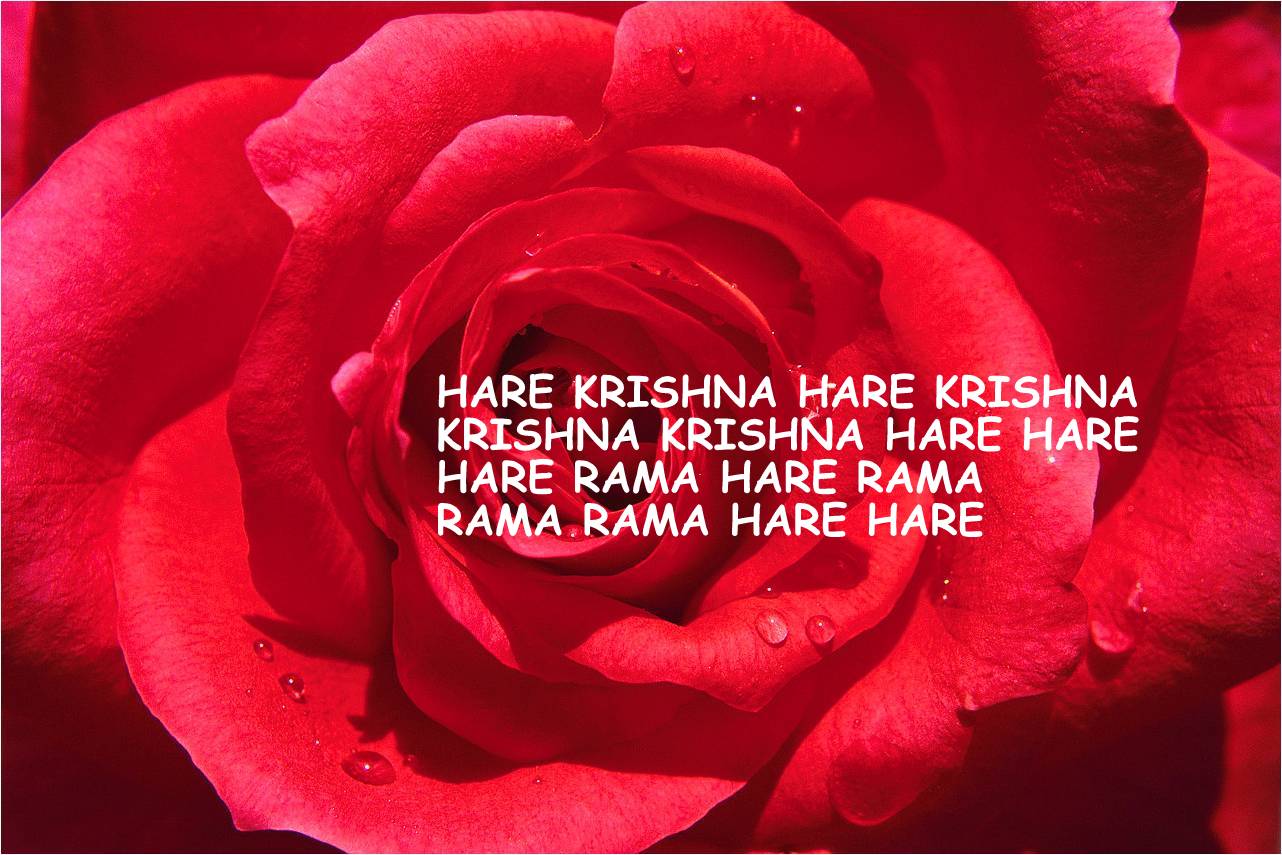
click on image to enlarge
The Spiritual Potency of Chanting Hare Krishna
Sarvabhauma Bhattacarya once asked Lord Chaitanya: “Which item is most important in the execution of devotional service?” The Lord replied: “The most important item is the chanting of the holy name of the Lord.”
Sri Caitanya Mahaprabhu further explains, ceto-darpana-marjanam the mirror of one’s heart is cleansed by the holy names; and bhava-maha-davagni-nirvapanam, it extinguishes the blazing fire of material existence. By chanting the holy names one can destroy the sinful condition of material existence and purify the unclean heart.
There is no need, therefore, to understand the language of the mantra, nor is there any need for mental speculation or any intellectual adjustment for chanting this maha-mantra. It springs automatically from the spiritual platform, and as such, anyone can take part in the chanting without any previous qualification, and dance in ecstasy. (Srila Prabhupada)
More
25 Jun 2014
by The Hare Krishna Movement
in Chanting Hare Krishna, Letters by Srila Prabhupada, Maha-mantra, Mantra Meditation, Meditation
Tags: Hare Krishna, hare krishna means, Hare Krsna, Letters by Srila Prabhupada, Maha Mantra, maya, Radha and Krishna

please click on image to enlarge
“Our prayer of the Hare Krishna Mantra means addressing Radha and Krishna for being engaged in Their service. Hare Krishna means “Oh Hare, Oh Radharani! Oh Krishna! Please engage me in Your service so that I can get relief from the service of Maya.” (Letter to Subala das July 8, 1969)
More
10 May 2014
by The Hare Krishna Movement
in A.C. Bhaktivedanta Swami Prabhupada, Chanting Hare Krishna, Krishna Nectar, Krishna's flute, Krsna Consciousness, Sri Caitanya-Caritamrta
Tags: A.C. Bhaktivedanta Swami Prabhupada, chanting Hare Krishna, gopis, Krishna's Flute, Maha Mantra, Sri Caitanya-caritamrta, the Hare Krishna maha-mantra, vibration of Krsna's flute

“The vibration of His flute is just like a bird that creates a nest within the ears of the gopīs and always remains prominent there, not allowing any other sound to enter their ears. Indeed, the gopīs cannot hear anything else, nor are they able to concentrate on anything else, not even to give a suitable reply. Such are the effects of the vibration of Lord Kṛṣṇa’s flute.” (Madhya-lila 21.144)
…This vibration of Kṛṣṇa’s flute is represented by the Hare Kṛṣṇa mahā-mantra. A serious devotee of the Lord who chants and hears this transcendental vibration becomes so accustomed to it that he cannot divert his attention to any subject matter not related to Kṛṣṇa’s blissful characteristics and paraphernalia. (from purport)
Full Text and Purport More
14 Mar 2014
by The Hare Krishna Movement
in A.C. Bhaktivedanta Swami Prabhupada, Chanting Hare Krishna, Hare Krishna Maha Mantra, Harinama Sankirtan, Sankirtan, The Hare Krishna Movement
Tags: A.C. Bhaktivedanta Swami Prabhupada, bhakta, devotee, Hare Krishna Maha-mantra, hari nama, holy name of the lord, Krsna consciousness movement, Lord Caitnaya, Maha Mantra, mantra mediation, sankirtan, Sri Caitanya Mahaprabhu, The Hare Krishna Movement

click on image to enlarge
Following in the footsteps of Lord Caitanya Mahāprabhu, the Kṛṣṇa consciousness movement is distributing the Hare Kṛṣṇa mahā-mantra and inducing people all over the world to chant. We are giving people an immense treasury of transcendental literature, translated into all the important languages of the world, and by the grace of Lord Śrī Caitanya Mahāprabhu this literature is selling profusely, and people are chanting the Hare Kṛṣṇa mahā-mantra with great delight. This is the preaching process of the Caitanya cult. Since the Lord wanted this cult preached all over the world, the International Society for Krishna Consciousness is acting in a humble way so that the vision of Śrī Caitanya Mahāprabhu may be fulfilled all over the world, especially in the Western countries. (Purport to Cc. Adi-lila 16.19)
…the human form of life is a chance to understand, and if one misses this opportunity, he is most unfortunate. The way to get out of illusory māyā is to engage in the topics of Kṛṣṇa. Lord Caitanya advocated a process whereby everyone may remain in his present position without change but simply hear from the proper authoritative sources about Kṛṣṇa. Lord Caitanya advised everyone to spread the word of Kṛṣṇa. He advised, “All of you become spiritual masters. Your duty is simply to talk to whomever you meet of Kṛṣṇa or of the instructions given by Kṛṣṇa.” The International Society for Krishna Consciousness is operating for this purpose. We do not ask anyone to first change his position and then come to us. Instead, we invite everyone to come with us and simply chant Hare Kṛṣṇa, Hare Kṛṣṇa, Kṛṣṇa Kṛṣṇa, Hare Hare/ Hare Rāma, Hare Rāma, Rāma Rāma, Hare Hare, because we know that if one simply chants and hears the topics of Kṛṣṇa, one’s life will change; he will see a new light, and his life will be successful. ( from purport to SB 4.7.44)
This morning my reading took me to the following verses which describe the importance and ecstasy of chanting Hare Krishna. We share with you these very nice verses and purports More
02 Mar 2014
by The Hare Krishna Movement
in A.C. Bhaktivedanta Swami Prabhupada, Chanting Hare Krishna, Maha-mantra, Mantra Meditation, Quotes by Srila Prabhupada
Tags: A.C. Bhaktivedanta Swami Prabhupada, chanting Hare Krishna, forgetfulness, Hare Krishna, Hare Krsna, holy name, Maha Mantra, quotes by Srila Prabhupada, remembering Krishna, remembering the Supreme Perosnality of Godhead, Srila Prabhupada

click on image to enlarge
” Simply our prayer should be, My dear Krishna, please remind me to always chant Your Holy Name, please do not put me into forgetfulness. You are sitting within me as Supersoul, so you can put me into forgetfulness or into remembering You. So please do not put me into forgetfulness. Please always remind me to chant, even You send me into the hell, it doesn’t matter, just so long as I can always chant Hare Krishna…” (from Srila Prabhupada’s letter to Devananda dated Nov.23,1968)
More
21 Feb 2014

In the old days, book distributors and sankirtan devotees usually carried some mantra cards like the one above to distribute. Hopefully this practice is still going on, because if there was only one piece of literature being distributed, it should be the maha- mantra, or the great mantra for deliverance.
Following in the footsteps of Lord Caitanya Mahāprabhu, the Kṛṣṇa consciousness movement is distributing the Hare Kṛṣṇa mahā-mantra and inducing people all over the world to chant. We are giving people an immense treasury of transcendental literature, translated into all the important languages of the world, and by the grace of Lord Śrī Caitanya Mahāprabhu this literature is selling profusely, and people are chanting the Hare Kṛṣṇa mahā-mantra with great delight. This is the preaching process of the Caitanya cult. Since the Lord wanted this cult preached all over the world, the International Society for Krishna Consciousness is acting in a humble way so that the vision of Śrī Caitanya Mahāprabhu may be fulfilled all over the world, especially in the Western countries. (from purport to Adi-lila, 6.19)
More
Image
by The Hare Krishna Movement
31 Oct 2013
by The Hare Krishna Movement
in A.C. Bhaktivedanta Swami Prabhupada, Panca-Tattva, Sankirtan, Sri Caitanya-Caritamrta
Tags: A.C. Bhaktivedanta Swami Prabhupada, chanting Hare Krishna, Hare Hare, Hare Krishna, Hare Krishna mahamantra, Hare Rama, incarnation, internal potencey, Lord Caitanya, Maha Mantra, mahaprabhu, marginal potency, most magnanimous incarnation, panca tattva mantra, plenary expansion, sankirtan jajna, Sri Krsna Caitanya, ultimate benediction, śrī-kṛṣṇa-caitanya prabhu-nityānanda śrī-advaita gadādhara śrīvāsādi-gaura-bhakta-vṛnda
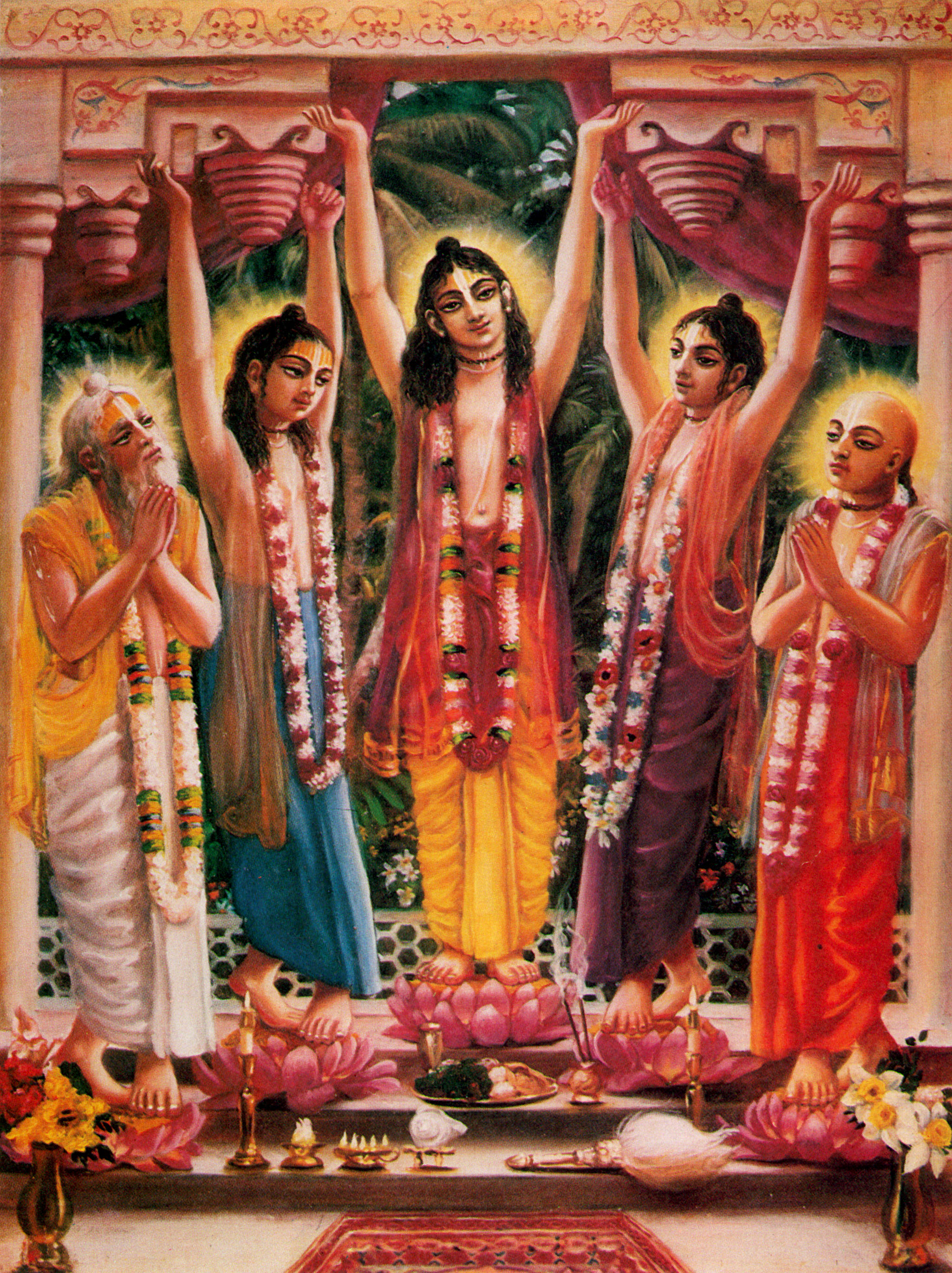
“Love of Godhead is the ultimate benediction for all human beings.” Śrī Caitanya Mahāprabhu is the bestower of this great benediction.
“In the Age of Kali, people who are endowed with sufficient intelligence will worship the Lord, who is accompanied by His associates, by performance of saṅkīrtana-yajña.” (Bhāg. 11.5.32)
…Śrī Caitanya Mahāprabhu is always accompanied by His plenary expansion Śrī Nityānanda Prabhu, His incarnation Śrī Advaita Prabhu, His internal potency Śrī Gadādhara Prabhu and His marginal potency Śrīvāsa Prabhu. He is in the midst of them as the Supreme Personality of Godhead. One should know that Śrī Caitanya Mahāprabhu is always accompanied by these other tattvas. Therefore our obeisances to Śrī Caitanya Mahāprabhu are complete when we say śrī-kṛṣṇa-caitanya prabhu-nityānanda śrī-advaita gadādhara śrīvāsādi-gaura-bhakta-vṛnda. As preachers of the Kṛṣṇa consciousness movement, we first offer our obeisances to Śrī Caitanya Mahāprabhu by chanting this Pañca-tattva mantra; then we say Hare Kṛṣṇa, Hare Kṛṣṇa, Kṛṣṇa Kṛṣṇa, Hare Hare Hare Rāma, Hare Rāma, Rāma Rāma, Hare Hare. There are ten offenses in the chanting of the Hare Kṛṣṇa mahā-mantra, but these are not considered in the chanting of the Pañca-tattva mantra, namely, śrī-kṛṣṇa-caitanya prabhu-nityānanda śrī-advaita gadādhara śrīvāsādi-gaura-bhakta-vṛnda. Śrī Caitanya Mahāprabhu is known as mahā-vadānyāvatāra, the most magnanimous incarnation, for He does not consider the offenses of the fallen souls. Thus to derive the full benefit of the chanting of the mahā-mantra (Hare Kṛṣṇa, Hare Kṛṣṇa, Kṛṣṇa Kṛṣṇa, Hare Hare Hare Rāma, Hare Rāma, Rāma Rāma, Hare Hare), we must first take shelter of Śrī Caitanya Mahāprabhu, learn the Pañca-tattva mahā-mantra, and then chant the Hare Kṛṣṇa mahā-mantra. That will be very effective. (Purport from Sri Caitanya-caritamrta, Adi-lila 7.4)
More
24 Oct 2013
by The Hare Krishna Movement
in A.C. Bhaktivedanta Swami Prabhupada, Japa, Nectar of Devotion, Practicing Krishna Consciousness at Home
Tags: A.C. Bhaktivedanta Swami Prabhupada, chanting Hare Krishna, holy name, japa, japa bag, japa beads, kirtan, Maha Mantra, mantra meditation

This is such a beautiful picture of Srila Prabhupada with his japa bag, that we thought we would do a short post on ‘japa’.
When a mantra or hymn is chanted softly and slowly, that is called japa. The same mantra, when chanted loudly, is called kīrtana. For example, the mahā-mantra (Hare Kṛṣṇa, Hare Kṛṣṇa, Kṛṣṇa Kṛṣṇa, Hare Hare/ Hare Rāma, Hare Rāma, Rāma Rāma, Hare Hare) when uttered very softly only for one’s own hearing is called japa. The same mantra, when chanted loudly for being heard by all others, is called kīrtana. The mahā-mantra can be used for japa and kīrtana also. When japa is practiced it is for the personal benefit of the chanter, but when kīrtana is performed it is for the benefit of all others who may hear.
In the Padma Purāṇa there is a statement: “For any person who is chanting the holy name either softly or loudly, the paths to liberation and even heavenly happiness are at once open.” (Nectar of Devotion Chapter 9)
Of all the sacrifices, the chanting of Hare Kṛṣṇa, Hare Kṛṣṇa, Kṛṣṇa Kṛṣṇa, Hare Hare/ Hare Rāma, Hare Rāma, Rāma Rāma, Hare Hare is the purest representation of Kṛṣṇa. (from purport; Bhagavad-gita 10.25)
More
09 Aug 2013
by The Hare Krishna Movement
in A.C. Bhaktivedanta Swami Prabhupada, Chanting Hare Krishna, Maha-mantra, Mantra Meditation, Nectar of Devotion
Tags: A.C. Bhaktivedanta Swami Prabhupada, chanting Hare Krishna, Hare Hare, Hare Krsna, Hare Rama, heavenly happiness, liberation, Maha Mantra, mantra meditation, Nectar of Devotion, singing the flories of the Lord

This morning I was reading from the Nectar of Devotion the chapter entitled “The Mahā-mantra”. We have posted the entire chapter as well as some other related quotes from the Nectar of Devotion on the Maha-mantra.
In the Padma Purāṇa there is a statement: “For any person who is chanting the holy name either softly or loudly, the paths to liberation and even heavenly happiness are at once open.”
When a mantra or hymn is chanted softly and slowly, that is called japa. The same mantra, when chanted loudly, is called kīrtana. For example, the mahā-mantra (Hare Kṛṣṇa, Hare Kṛṣṇa, Kṛṣṇa Kṛṣṇa, Hare Hare/ Hare Rāma, Hare Rāma, Rāma Rāma, Hare Hare) when uttered very softly only for one’s own hearing is called japa. The same mantra, when chanted loudly for being heard by all others, is called kīrtana. The mahā-mantra can be used for japa and kīrtana also. When japa is practiced it is for the personal benefit of the chanter, but when kīrtana is performed it is for the benefit of all others who may hear.
In the Liṅga Purāṇa there is a statement about glorifying and singing about the Lord. It is said there: “A brāhmaṇa who is constantly engaged in singing the glories of the Lord is surely elevated to the same planet as the Supreme Personality of Godhead. Lord Kṛṣṇa appreciates this singing even more than the prayers offered by Lord Śiva.”
In the Viṣṇu-dharma there is a statement glorifying this process of congregational chanting: “My dear King, this word ‘Kṛṣṇa’ is so auspicious that anyone who chants this holy name immediately gets rid of the resultant actions of sinful activities from many, many births.” That is a fact. There is the following statement in Caitanya-caritāmṛta: “A person who chants the holy name of Kṛṣṇa once can counteract the resultant actions of more sinful activities than he is able to perform.” A sinful man can perform many, many sinful activities, but he is unable to perform so many that they cannot be wiped out by one single uttering of “Kṛṣṇa.”
“Anyone who is engaged in chanting My transcendental name must be considered to be always associating with Me. And I may tell you frankly that for such a devotee I become easily purchased.”
In the Padma Purāṇa also it is stated: “The chanting of the Hare Kṛṣṇa mantra is present only on the lips of a person who has for many births worshiped Vāsudeva.” It is further said in the Padma Purāṇa, “There is no difference between the holy name of the Lord and the Lord Himself. As such, the holy name is as perfect as the Lord Himself in fullness, purity and eternity. The holy name is no material sound vibration, nor has it any material contamination.”
Full Chapter More
15 Jul 2013
by The Hare Krishna Movement
in A.C. Bhaktivedanta Swami Prabhupada, Chanting Hare Krishna, Lectures
Tags: A.C. Bhaktivedanta Swami, Avatara, chanting Hare Krishna, Hare, Hare Krishna, Krishna, lecture on the maha-mantra, Maha Mantra, mantra, mantra meditation, prabhupada, Prabhupada Lecture, Rama, sound incarnation, Srila Prabhupada, swami, transcendental sound

So this sound, this Hare Krsna, Hare Krsna, Krsna Krsna, Hare Hare. Hare Rama, Hare Rama, Rama Rama, Hare Hare, is the sound representation of the Supreme Lord.
Lecture on Maha-mantra
By His Divine Grace A.C. Bhaktivedanta Swami Prabhupada
Recorded September 8th, 1966, New York
Prabhupada: Now, some of you members have asked me to explain the meaning of this chanting, Hare Krishna, Hare Krsna, Krsna Krsna, Hare Hare. Hare Rama, Hare Rama, Rama Rama, Hare Hare. Now, this sound is transcendental sound, transcendental sound, incarnation, sound incarnation of the Absolute Truth. Just try to understand what is incarnation. Incarnation means… The Sanskrit word is avatara, and that is translated into English as “incarnation.” Of course, the root meaning of incarnation I cannot exactly explain to you, but the root meaning of the… (aside:) The root meaning of avatara is “which comes from the transcendental sky, the spiritual sky to the material sky.” That is called avatara. Avatarana. Avatarana. Just like… Avatarana means “coming from up to down.” That is called avatarana. And avatara is understood that when God or His bona fide representative comes from that sky to this material plane, that is called avatara.
More
26 Dec 2012
by The Hare Krishna Movement
in Chanting Hare Krishna, Sri Nandanandana das, Stephen Knapp
Tags: age of kali, age of quarrel and anxiety, chanting Hare Krishna, Hare Krishna, Hare Rama, Maha Mantra, mantra meditation, sixteen words, Sri Nandanandana das, Stephen Knapp, Vedic Scriptures, yoga

This is Part 2 in the series on chanting by Sri Nandanandana Prabhu. This is a collection of quotes from the Vedic Scriptures advocating the merits of chanting the Holy Names. To read Part 1
Chanting the Maha-Mantra
by Stephen Knapp (Sri Nandanandana dasa)
Part 2
There are many Vedic references which specifically recommend the chanting of the Hare Krishna maha-mantra as the most effective and advantageous means of reaching spiritual realization and counteracting all the problems of this age. Some of these verses are the following:
These sixteen words–Hare Krishna, Hare Krishna, Krishna Krishna, Hare Hare/Hare Rama, Hare Rama, Rama Rama, Hare Hare–are especially meant for counteracting the ill effects of the present age of quarrel and anxiety. (Kali-santarana Upanishad)
More
28 Sep 2012
by The Hare Krishna Movement
in Chanting Hare Krishna, Japa, Practicing Krishna Consciousness at Home
Tags: chanting, chanting Hare Krishna, God, Hare, Hare Krishna, Holy Names of the Lord, japa, kirtana, Krishna, Maha Mantra, practicing krishna consciousness at home, Rama

It has been requested that we do a post on Japa Meditation, so on this auspicious day of the appearance of Haridasa Thakura, we share with you some instructions on the chanting of Japa.
…Since God is all-powerful and all-merciful, He has kindly made it very easy for us to chant His names, and He has also invested all His powers in them. Therefore the names of God and God Himself are identical. This means that when we chant the holy names of Krishna and Rama we are directly associating with God and being purified. Therefore we should always try to chant with devotion and reverence. The Vedic literature states that Lord Krishna is personally dancing on your tongue when you chant His holy name.
More
12 Sep 2012
by The Hare Krishna Movement
in Chanting Hare Krishna
Tags: age of kali, Hare Kṛṣṇa Mahā-mantra, Hare Krishna, harer nama harer nama harer namaiva kevalam, hari kirtan, holy name of the lord, Maha Mantra, Padma Purana, sankirtan, spiritual energy, spiritual vibration, Sri Caitanya Mahaprabhu
Previous Older Entries
































